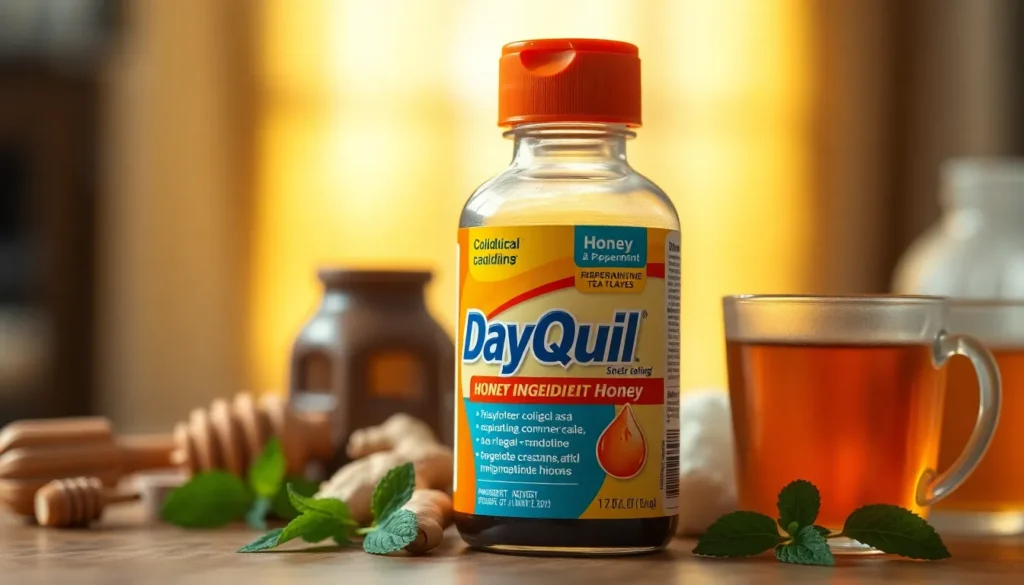Table of Contents
ToggleDayQuil is a popular over-the-counter medication designed to relieve cold and flu symptoms. Many people reach for it when they need to power through their day. However, a common question arises: can DayQuil make you sleepy? Understanding how this medication works and its potential side effects is crucial for anyone looking to alleviate their symptoms without unwanted drowsiness.
While DayQuil typically contains ingredients aimed at keeping you alert, individual reactions can vary. Some users report feeling tired after taking it, raising concerns about its impact on daily activities. This article delves into the ingredients of DayQuil and explores the link between its use and feelings of fatigue, helping readers make informed choices about their cold and flu relief.
Understanding DayQuil
DayQuil is an over-the-counter medication designed to alleviate cold and flu symptoms. It contains specific ingredients that typically aim to maintain alertness during use, though individual responses can vary.
Active Ingredients in DayQuil
DayQuil’s formulation includes three primary active ingredients:
- Acetaminophen: Provides pain relief and reduces fever.
- Dextromethorphan: Acts as a cough suppressant, lessening the urge to cough.
- Phenylephrine: Serves as a decongestant, relieving nasal congestion.
These components work together to offer symptom relief while typically minimizing drowsiness, contrary to other medications designed for nighttime use.
Intended Uses of DayQuil
DayQuil targets several symptoms associated with colds and flu, including:
- Fever: Reduces elevated body temperature.
- Cough: Suppresses persistent coughs.
- Congestion: Alleviates nasal and sinus pressure.
- Sore Throat: Eases throat discomfort.
This medication is specifically intended for daytime use, allowing individuals to manage symptoms without the sedative effects commonly found in nighttime formulations.
The Link Between DayQuil and Sleepiness

DayQuil’s formulation aims to keep users alert, yet individual responses can vary. Some individuals may experience fatigue despite the intended effects of the medication.
How DayQuil Affects the Body
DayQuil contains active ingredients that interact with the body’s systems. Acetaminophen reduces pain and fever, dextromethorphan suppresses coughing, and phenylephrine alleviates nasal congestion. These ingredients work synergistically to address cold and flu symptoms while promoting daytime wakefulness. The absence of sedatives means most users remain alert, but reactions may differ based on personal health and tolerance levels.
Common Side Effects of DayQuil
DayQuil may produce several side effects in some users. Common side effects include:
- Nausea: Some individuals may feel queasy after taking the medication.
- Dizziness: Users can experience lightheadedness, affecting their balance.
- Fatigue: Although fatigue isn’t a primary effect, some may feel tired after use.
- Insomnia: A small number may struggle with sleep, especially if taken later in the day.
Awareness of these side effects is crucial for users who need to manage their activities after taking DayQuil.
Individual Responses to DayQuil
Individual reactions to DayQuil can vary significantly, affecting how alert or sleepy a person feels after taking it. Factors such as personal health, existing conditions, and tolerance levels play a critical role in these varying responses.
Factors Influencing Sleepiness
- Individual Health: Pre-existing health conditions, such as allergies, asthma, or mental health disorders, can impact how DayQuil interacts with the body. These conditions may lead to unexpected drowsiness in some individuals.
- Body Weight: Body weight affects drug metabolism. Individuals with higher body weight may process the medication differently, potentially influencing feelings of alertness or fatigue.
- Dosage: Dosage can determine the intensity of DayQuil’s effects. Higher doses, although not recommended, might increase side effects, including sleepiness, while recommended doses generally promote wakefulness.
- Caffeine Intake: Concurrent caffeine consumption may counteract DayQuil’s intended effects. Those who consume caffeine may experience less drowsiness compared to individuals who abstain from it.
- Sleep Quality: Poor sleep quality prior to taking DayQuil significantly impacts reactions. Tiredness from lack of sleep can exacerbate feelings of fatigue, overriding the medication’s alertness-promoting ingredients.
Personal Accounts and Anecdotes
Many users report varying experiences with DayQuil related to drowsiness levels. Some individuals note feeling more energized after taking the medication, while others describe episodes of unexpected fatigue.
- User A: This person took DayQuil while battling a cold and experienced increased alertness, allowing them to continue daily activities without interruptions.
- User B: In contrast, this individual felt unusually sleepy after using DayQuil, attributing the fatigue to pre-existing allergies that heightened their sensitivity to the medication’s components.
- User C: Another user reported that combining DayQuil with caffeine provided a balanced effect, helping manage both cold symptoms and energy levels without resulting in drowsiness.
These anecdotal experiences highlight the variability in individual responses to DayQuil, underscoring the importance of understanding personal health conditions and habits.
Alternatives to DayQuil for Cold Relief
Various alternatives exist for cold relief that avoid potential drowsiness associated with medications like DayQuil. These options include non-drowsy medications and natural remedies.
Non-Drowsy Options
Non-drowsy cold medications often include active ingredients that prevent sedation. Popular choices are:
- Phenylephrine, a decongestant that relieves nasal congestion.
- Guaifenesin, an expectorant that thins mucus, easing coughing.
- Dextromethorphan, a cough suppressant that controls coughing without inducing sleepiness.
Brands such as Sudafed PE and Robitussin offer formulations specifically designed to provide relief without causing fatigue. Always check labels for specific non-drowsy claims.
Natural Remedies
Natural remedies provide effective alternatives for cold symptoms while minimizing drowsiness. Options include:
- Honey, known for its soothing effects on sore throats and coughs.
- Peppermint tea, which may relieve nasal congestion and promote relaxation.
- Ginger, recognized for its anti-inflammatory properties and ability to ease nausea.
These remedies can support recovery, but individuals should consult healthcare professionals for personalized advice, especially when considering interactions with other medications.
DayQuil is generally designed to keep users alert while alleviating cold and flu symptoms. However individual responses can vary significantly. Factors like personal health conditions and caffeine intake may influence whether someone feels drowsy after taking it.
For those who experience fatigue, exploring alternatives that specifically target cold symptoms without causing sleepiness might be beneficial. Options like Sudafed PE or natural remedies such as honey and ginger can provide relief while helping maintain energy levels.
Ultimately understanding one’s own body and consulting with healthcare professionals can lead to better choices in managing symptoms effectively without unwanted drowsiness.







